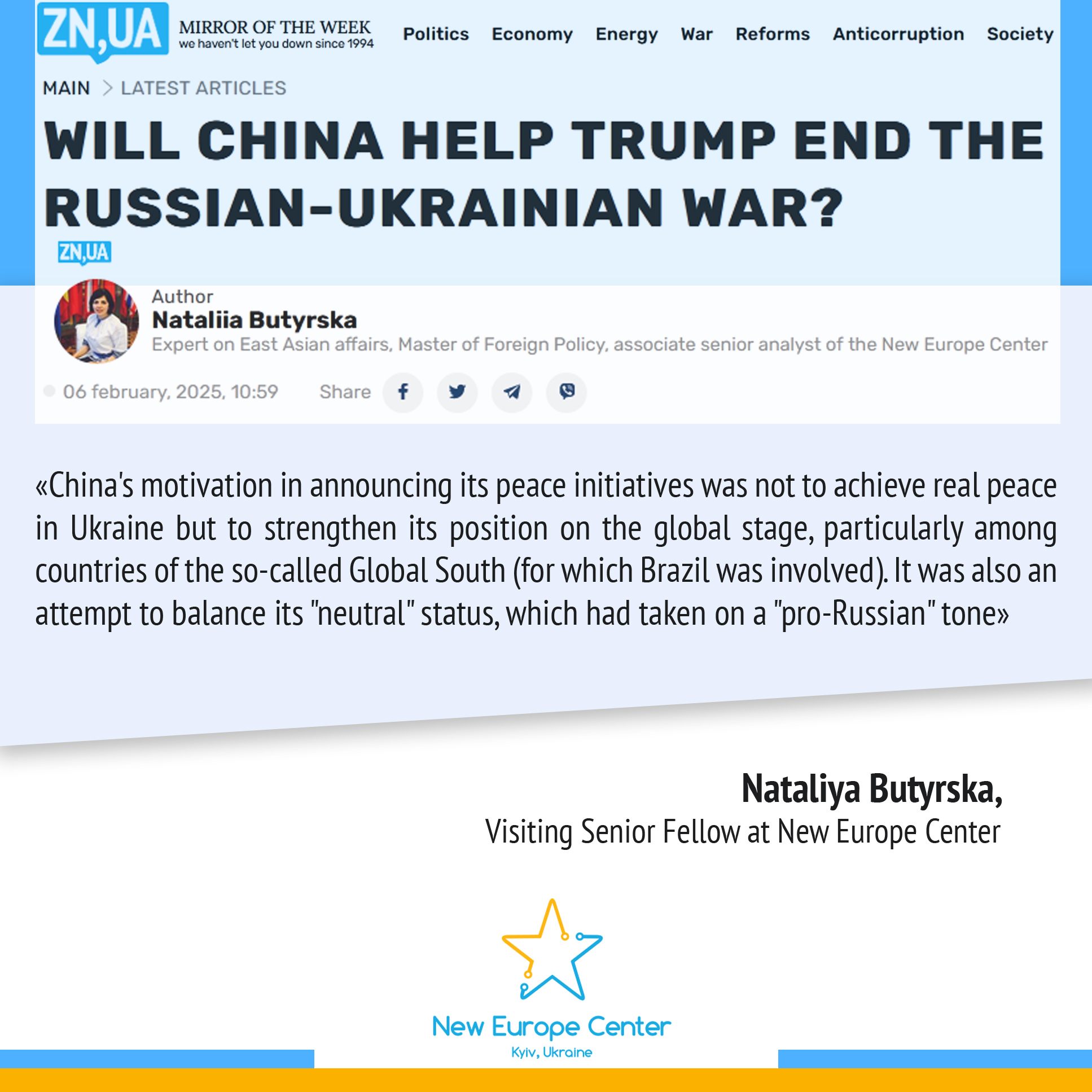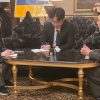
Media-version of analysis was kindly published by Mirror of the Week
Donald Trump is trying to involve China in the peaceful resolution of the Russia-Ukraine war. The American president’s desire to end the conflict as quickly as possible aligns with the statements of the Chinese leadership, which has repeatedly called on both sides to cease fire and seek a diplomatic resolution. The question arises: what role does Trump envision for Beijing in the peace process? And is China willing to become a real force capable of investing its diplomatic capital in achieving peace in Ukraine, or will it continue to simulate peacekeeping efforts without taking concrete steps?
After being re-elected as president, Donald Trump repeatedly called on China to help end the Russia-Ukraine war in his speeches and on social media. During his speech at the World Economic Forum in Davos—the first international event after his inauguration—he once again reiterated: “We hope China can help us stop the war, particularly with Russia and Ukraine. They have significant influence over this situation, and we will work with them. I mentioned this during our phone call with President Xi, and hopefully, we can work together to stop it.”[1]
Joint efforts to end the war in Ukraine and stabilize the Middle East could set a precedent for further cooperation between the two countries, whose relations are marked by intense economic and technological competition, mutual distrust, and global rivalry. Moreover, resolving these issues would help Donald Trump solidify his status as a successful dealmaker capable of resolving global conflicts, while for Xi Jinping, it would be an opportunity to strengthen China’s role as a responsible global player—both domestically and internationally—as well as improve relations with the American president. Additionally, Trump’s stance and that of his team align with the Brazil-China initiative, which China is trying to promote with Brazil’s support. Both approaches consider making concessions to Russia at the expense of Ukrainian interests in order to reach a ceasefire and achieve a potential agreement between Ukraine and Russia.
How does Trump’s vision align with the Brazil-China initiative?
Although Donald Trump has not presented any official plan for ending the war, explaining that once revealed, it would become a “worthless plan,” statements made by the American president and members of his team allow for a generalized understanding of potential peace proposals and their comparison with the Brazil-China initiative:
| Commonality | Difference | |
| 1. De-escalation of the Situation | Both sides call for an immediate ceasefire. | Trump focuses on achieving a ceasefire agreement through persuasion and coercion directed at both parties to bring them to the negotiation table. Meanwhile, the Brazil-China initiative is limited to general appeals to “all interested parties” and lacks specific proposals for its implementation. |
| 2. Dialogue and Negotiations | Both sides agree that dialogue is the only way to resolve the conflict and support peace talks. | China and Brazil call on “all” parties to create conditions for peace negotiations and support an international peace conference recognized by both Russia and Ukraine (this idea was proposed before the Peace Summit in Switzerland in June 2024 and appeared as an attempt to undermine Ukraine’s efforts toward peaceful conflict resolution).
Trump seeks to immediately bring the parties to the negotiation table and openly discusses the necessity of concessions from both sides. He positions himself as a mediator between Zelenskyy and Putin. |
| 3. Humanitarian Aid and Civilian Protection | Both sides agree on the necessity of protecting civilians and ending the humanitarian crisis. | Trump and his team do not emphasize specific aspects of humanitarian aid or the exchange of prisoners of war, whereas the Brazil-China initiative officially includes these issues as a separate point. |
| 4. Nuclear and Chemical Weapons | Both sides condemn the threat of using nuclear, chemical, and biological weapons and call for avoiding nuclear escalation. | Trump and his team highlight the risk of the U.S. being drawn into a conflict with a nuclear power, emphasizing the danger of escalation for the U.S. itself. Brazil and China, on the other hand, call for efforts to prevent the proliferation of nuclear weapons and avoid a nuclear crisis. |
| 5. Nuclear Facility Security | — | Brazil and China advocate for adherence to international nuclear safety laws, while Trump and his team do not address this topic separately. |
| 6. Economic Cooperation and Sanctions | — | The Brazil-China initiative opposes sanctions and isolation, while Trump uses sanctions, tariffs, and reduced oil prices as tools to pressure Russia into negotiations. |
| 7. Territorial Concessions | Trump’s approach aligns with the Brazil-China initiative in not demanding Russia to de-occupy Ukrainian territories or restore Ukraine’s sovereignty and territorial integrity. | Trump and his team explicitly state that Ukraine will need to agree to territorial concessions, while the Brazil-China initiative avoids direct mention of this but effectively accepts the territorial status quo. |
| 8. Security Guarantees | — | Trump’s team discusses the possibility of providing security guarantees to Ukraine and involving European allies in peacekeeping efforts. The Brazil-China initiative does not include any guarantees. |
| 9 . Demilitarized Zone and Peacekeepers | — | Trump and his team propose the creation of a demilitarized zone and the deployment of European peacekeeping forces to ensure the ceasefire. The Brazil-China initiative does not include mechanisms for monitoring and enforcing the ceasefire. |
Moreover, China and Trump’s team share a common position regarding Ukraine’s NATO membership: they adopt Russia’s narrative of NATO as a factor in the start of the Russia-Ukraine war and support Ukraine’s rejection of joining the alliance. However, their motives are entirely different.
China shares Russia’s “security concerns” about NATO’s expansion to its borders and the narrative of a U.S.-led proxy war (with NATO’s involvement) against Russia on Ukrainian territory by drawing parallels with a similar situation in its own region. Beijing views NATO as a key instrument in the U.S. global containment strategy aimed at curbing China’s rise. Specifically, China is concerned about NATO’s increased activity in the Asia-Pacific region and its growing cooperation with the “A4” (Japan, Australia, South Korea, New Zealand), which, from Beijing’s perspective, enhances external interference in regional affairs. Additionally, it fears that the U.S., through NATO, could involve European countries in conflicts in the Pacific.
Trump’s team, on the other hand, views Ukraine’s NATO membership as part of a potential compromise with Putin, which the Biden administration disregarded ahead of the full-scale invasion. For instance, Trump stated that he understands Putin’s general stance on NATO: “A big part of the problem is that Russia—for many, many years, long before Putin—said, ‘You could never bring NATO into Ukraine.’ Now they’ve said it. It was written in stone,” Trump said during a press conference at Mar-a-Lago on January 7. “And somewhere along the line, Biden said, ‘No. They should be able to join NATO.’ Well, then Russia has someone right on their doorstep, and I could understand their feelings about it.”[2]
Why did Ukraine and the West reject the Brazil-China proposal?
Unlike the United States, China’s motivation in announcing its peace initiatives was not to achieve real peace in Ukraine but to strengthen its position on the global stage, particularly among countries of the so-called Global South (for which Brazil was involved). It was also an attempt to balance its “neutral” status, which had taken on a “pro-Russian” tone. Beijing found it difficult to convince Ukraine and its Western partners of its impartiality, as alongside its diplomatic, political, economic, and informational support for Russia, China became an important supplier of dual-use goods (machinery, microelectronics, drones, cruise missile technologies), which significantly boosted Russia’s defense production and enabled it to wage a war of attrition.
Several rounds of “shuttle diplomacy” by special envoy Li Hui to Kyiv, Moscow, and several European capitals “for the political settlement of the ‘Ukrainian crisis'” failed to persuade Ukraine and Western allies to accept Chinese mediation services. Instead, Xi Jinping was expected to pressure Putin to withdraw Russian troops from Ukrainian territory and end the war. However, the only practical contribution by the Chinese leader in this direction was a warning to Putin against using nuclear weapons (recently mentioned by Antony Blinken regarding China’s role in reducing the nuclear threat).
The Brazil-China initiative does not offer mechanisms for achieving peace but is rather a set of proposals lacking substantive content. Beijing repeatedly called for the de-escalation of the “crisis in Ukraine” and the facilitation of peace talks. However, its appeals were not directed at Russia: the Chinese authorities avoided condemning Russian aggression and ignored the involvement of North Korean troops in military operations on Russia’s side, calling their military cooperation “a matter between the two parties.” Instead, China repeatedly urged the U.S. and Western allies to “stop pouring fuel on the fire,”[3] which in reality means halting arms supplies to Ukraine. This would effectively lead to the cessation of military actions and Ukraine’s capitulation—a goal Russia has consistently sought.
On December 20, 2024, China’s Deputy Permanent Representative to the United Nations, Geng Shuang, accused the U.S. of “seizing the opportunity under the pretext of maintaining regional security to weaken and contain other countries and serve its own agenda,” once again emphasizing China’s thesis that the U.S. is allegedly waging a proxy war against Russia using Ukrainians.
Strategic Benefits for China from the Prolonged War in Ukraine
China views the Russia-Ukraine war through the lens of its own confrontation with the United States, in which relations with Russia hold strategic importance. For this reason, China and Xi Jinping personally have invested significantly in deepening ties with Russia and with Putin himself. Over the three years of the war, Beijing has tested the boundaries of potential assistance to Russia while observing the West’s reaction and the consequences for itself. Fear of diplomatic, economic, and financial losses has restrained Beijing from providing more overt military support to Moscow. At the same time, China’s efforts are aimed at preventing a strategic defeat for the Kremlin in the war, as Russia serves as a counterbalance and an important partner for China against U.S. pressure.
In this context, a logical question arises: would Xi Jinping want to help Donald Trump end the war, given a reasonable concern that such an outcome would allow the U.S. to refocus its attention on confronting China? Especially considering that Trump’s circle includes many “hawks” advocating for tougher policies toward China.
Thus, prolonging the Russia-Ukraine war, provided nuclear escalation is avoided, could have added value for Beijing.
First, the war would continue to bind Western resources to supporting Ukraine, thereby preventing them from concentrating on the Indo-Pacific region.
Second, the prolongation of hostilities would deepen the rift between Russia and the West, pushing Russia into greater dependency on China.
Third, if Trump reduces U.S. commitments to European security and decreases support for Ukraine, it would undermine the geopolitical weight of the U.S. in Europe and the trust of its allies globally, creating opportunities for Beijing to strengthen its position in relations with them.
However, Donald Trump has set a goal to end the war, and his team is actively preparing for negotiations with Putin. A deal brokered by Trump with Russia could lead to the lifting of sanctions and improved relations between Russia and the West, potentially reducing Moscow’s dependency on Beijing. Trump’s statements about wanting to separate China and Russia are unlikely to go unnoticed by the Chinese authorities. China, on the one hand, is not interested in Russia’s defeat but, on the other, would not want to see a reduction in Russia’s dependency or an enhancement of its geopolitical position.
Given this, it is in China’s interest to not remain a passive peacemaker but to be an active participant in the process. The role China chooses to play will be crucial, considering the delicate balance of its own interests within the U.S.-China-Russia triangle.
China’s Balancing Role as a Key Factor in Future Negotiations
Ahead of potential negotiations with the United States, the Kremlin leader has set maximalist conditions that not only demand significant concessions from Ukraine but effectively amount to a call for its capitulation. The desire to discuss ending the conflict with Ukraine without its participation, as well as excluding European countries from the negotiation process (Nikolai Patrushev recently stated in an interview with KP.ru that negotiations on Ukraine should be conducted without the involvement of other Western countries: “The EU leadership has long lost the right to speak on behalf of many of its members… who take a balanced stance towards Russia”),[4] indicates that the Kremlin’s strategic goals extend beyond depriving Ukraine of statehood (Nikolai Patrushev: “It is not out of the question that this year Ukraine will cease to exist entirely”).[5] They also aim to secure a sphere of influence that could extend beyond the post-Soviet space (as evidenced by Putin’s pre-war demands for NATO to roll back to its 1997 borders).
To achieve its goals, Moscow needs China’s support in the future negotiation process concerning the war in Ukraine. Evidence of this is Putin’s phone call to Xi Jinping the day after Donald Trump’s inauguration, during which the Kremlin leader reiterated his demands, previously voiced at a Russian Security Council meeting: “The goal of the settlement should not be some short-term truce, not some brief respite, but a long-term peace based on respect for our objective interests.” In the event of failed negotiations for Russia, it is crucial for the Kremlin to secure continued comprehensive support from China to sustain a prolonged war.
Russia seeks to negotiate the resolution of the Russia-Ukraine conflict directly with the United States, excluding both Ukraine and other Western countries from the process. Meanwhile, President Zelenskyy believes that Ukraine, the U.S., Europe, and Russia must participate in future negotiations.[6]
Donald Trump has called on China to assist, but China’s role in the peace process is currently seen as that of a party with influence over Putin, potentially capable of bringing him to the negotiation table. However, given China’s promotion of its own peace initiatives, which include convening a peace conference with the participation of Russia, Ukraine, and other countries, as well as forming a so-called “Peace Group” (which China unexpectedly decided to convene in the near future), Beijing has ambitions to gain broader recognition for its mediation efforts and influence on the processes shaping Europe’s security architecture. This carries the risk of bias and the likelihood of advancing Russia’s interests, given their close strategic coordination on global political issues.
What is China’s Interest in Participating in the Peace Process?
Meanwhile, Beijing itself is trying to improve relations with the new U.S. administration. Following his re-election, Donald Trump and Xi Jinping took a series of steps indicating attempts by both sides to ease the tensions in bilateral relations that arose during Trump’s first term: inviting Xi Jinping to the inauguration—a first in the history of their relations; sending Vice President Han Zheng to attend the inauguration and hold talks with Trump’s team; a phone call between the two leaders before Trump assumed the presidency; Trump’s softened rhetoric toward China; and an executive order extending TikTok’s operations by 75 days despite a Supreme Court ban.
Beijing has repeatedly criticized the Biden administration for baselessly accusing it of insufficient efforts to end the “Ukrainian crisis” and has called for “working with the relevant countries, including China, to jointly create the necessary conditions and atmosphere for the political resolution of the ‘Ukrainian crisis.'” The Trump administration is now more open to engaging with China, and their positions on resolving the Russia-Ukraine conflict align on many points.
However, China’s involvement in resolving the conflict could be rooted in its own strategic interests. China may link its assistance to Donald Trump with U.S. policy toward Taiwan and the overall trajectory of current U.S.-China relations, aiming to secure a broader agreement beyond trade and economic issues, encompassing security matters in its region as well as conflicts in Ukraine and the Middle East. Thus, the American president could face a higher price set by Beijing for addressing pressing international issues, particularly ending the Russia-Ukraine war.
Donald Trump skillfully employs a strategy of “carrots and sticks” in his foreign policy. He has already imposed a 10% tariff on China, citing a commitment to halt the influx of fentanyl and other drugs into the U.S.[7] Trump has demonstrated his willingness to use coercive methods to extract greater concessions from Beijing. In an interview with Fox News, he emphasized: “We have one very big power over China, and that’s tariffs, and they don’t want them, and I’d rather not use them. But it’s a huge power over China.” When asked by a journalist whether he could strike a deal with the Chinese leader, he replied: “I can do it because we have what they want; we have the pot of gold.”[8] (Evidently, Trump is emphasizing the U.S.’s trade advantages for China: Chinese exports to the U.S. reached $401 billion in the first 11 months of 2024, while American goods to China amounted to just $131 billion; by the end of 2024, Chinese exports to the U.S. grew by 4% year-on-year).
To some extent, this strategy could also work in influencing China’s stance on Russia to end the war. After all, the threat of secondary sanctions and pressure on China’s financial system forced Chinese authorities to more closely monitor trade with Russia and tighten export controls on dual-use goods. However, this proved insufficient. Increasing the cost of supporting Moscow could become an argument for China to transition from imitating peace efforts to taking genuine steps. Beijing faces a choice: either it limits military support for Russia and helps end the war, in exchange for the opportunity to maintain favorable economic and trade relations with the U.S. and Europe, or it faces negative consequences and a significant deterioration in relations with the West. Everything depends on the Trump administration’s ability to create pressure conditions that are truly impactful for Beijing. If the American president’s strategy lacks consistency and U.S. pressure is not convincing enough, China could exploit American weaknesses, leading to broader geopolitical consequences.
Conclusion
Donald Trump seeks to involve Beijing in the process of resolving the Russia-Ukraine war. Unlike the Biden administration, which was critical of Chinese peace initiatives, including the Brazil-China proposal for the political settlement of the “Ukrainian crisis,” the position of the newly elected American president largely aligns with it. Thus, China has an opportunity to implement its mediation services and, at the same time, demonstrate its practical willingness to support the American president in achieving his presidential goal—to become the “man who brought peace to the world.”
For Beijing itself, firstly, this would eliminate the threat of military confrontation with the U.S., at least during Trump’s presidency, as he wants to be a president of “peace,” not “war.” Secondly, it would improve its image, which has been undermined by its relations with Russia, particularly among EU countries. Thirdly, a ceasefire would help stabilize global trade, energy, and food markets, which is in China’s interest.
However, there are too many factors that will influence China’s decision regarding its role in ending the war. Beijing’s position will be determined by the trajectory of U.S.-China relations and the ability of the new American administration to manage this trajectory. In the new confrontation of Trump 2.0, each country is undergoing a test of resilience. And, unfortunately, one of the games will unfold around the Russia-Ukraine war.
The material prepared with the support of the International Renaissance Foundation. The material reflects the position of the authors and does not necessarily coincide with the position of the International Renaissance Foundation.
[1] Remarks by President Trump at the World Economic Forum. White House. January 23, 2025 https://www.whitehouse.gov/remarks/2025/01/remarks-by-president-trump-at-the-world-economic-forum/
[2] Read the Full Transcript of Donald Trump’s 2024 Person of the Year Interview With TIME. December 12,2024. https://time.com/7201565/person-of-the-year-2024-donald-trump-transcript/
[3] Zhao Huirong US, not China, adding fuel to the Ukraine crisis. ChinaDaily. April 25, 2024. https://www.chinadailyhk.com/hk/article/581786
[4] Andrei Baranov, Nikolai Patrushev: “It is not out of the question that Ukraine will cease to exist this year.” January 14, 2025. https://www.kp.ru/daily/27651/5036217/
[5] Ibid
[6] Zelenskyy named the 4 parties he wants to see in future negotiations. Ukrainian Pravda, January 25, 2025. https://www.pravda.com.ua/news/2025/01/25/7495261/
[7] Fact Sheet: President Donald J.Trump Imposes tariffs on imports from Canada, Mexico and China. White House, February 1, 2025. https://www.whitehouse.gov/fact-sheets/2025/02/fact-sheet-president-donald-j-trump-imposes-tariffs-on-imports-from-canada-mexico-and-china/
[8] US President Donald Trump says ‘rather not’ put tariffs on Chinese goods, days after warning of 10% levy. HKFP. January 24, 2025. https://hongkongfp.com/2025/01/24/us-president-donald-trump-says-rather-not-put-tariffs-on-chinese-goods-days-after-warni







